- Home
- Karin Kallmaker
Just Like That Page 2
Just Like That Read online
Page 2
“Bennett, you’ve never been settled and I think you’ve been happy.”
“That’s me, not you. I never was the settling kind.” She rinsed her hands again with an air of finality.
“Maybe I’m not either.”
Bennett snapped the lid on the tapenade shut. “I knew your mother, and you are just like her. Some people are meant to go around in pairs, and Jane Lucas should have nothing to say to a woman like Missy Bingley.”
“Why not? A woman named Missy seems exactly like Jane’s type.”
Drawers were being opened and examined with increasing agitation. “I don’t know why you persist in being so obtuse. Jane is a very nice girl but she’s eccentric.”
“You mean she works with her hands.”
“If you insist, yes. I know she calls those paintings art, but it might as well be mud she’s slapping onto the canvas. Cheaper than all that wasted paint. She is hardly suitable as a partner for someone like Missy Bingley, who I’m told is extremely cultured and affable.”
Syrah knew better than to argue. Bennett had lived all her life in the valley and had spent the majority of it ruling the Ardani household with her iron fist. Not for the first time Syrah marveled at the traditionalist values that kept Bennett going to mass three times a week but somehow blended with her staunch loyalty toward all things Ardani. She’d play matchmaker between two lesbians and go to confession for having brought about such an event, then sleep like a baby.
Syrah was rescued from further comment by her father’s tread outside the kitchen door. He held the bunch of grapes Syrah had left for him in one hand and looked both sleepy and pleased at the same time.
“What did you think?” He hoisted the bunch at Syrah.
“They’ll be some of the best Gewürz’ we’ve had in a while.”
He grinned. “You got that right. Not a lot to mellow them yet, but the early rain brought the peach blossoms on early and the overtones will be there.”
Bennett bustled between them. “Netherfield has been bought, finally, and Syrah refuses to go and meet the woman. A very wealthy woman, I must say, and an asset to the community.” Bennett relieved Syrah’s father of the grapes, plopped them into a bowl and hurried out to the tasting room to leave them on the bar. The swinging door between kitchen and tasting room allowed Bennett’s continuing remarks to arrive in bursts. “You would think…can’t be single forever…Jane Lucas indeed…suitable and eligible…never see thirty again…”
Syrah watched her father pat his pockets. As usual, his glasses were in his breast pocket, which he checked last. “There was a letter in the post last week that I didn’t understand. Found it this morning and thought I should ask you.” He put the glasses on his nose and repeated the patting process until a folded envelope was discovered in his back pants pocket. He unfolded the enclosed letter and reviewed it with raised eyebrows before handing it to her.
“‘Mr. Anthony Ardani, Chairman of the Board.’ Huh?” Syrah gave her father a puzzled look. Chairman of the Board? “‘We regret that your lack of response to pressing concerns of Ardani Vineyards, Incorporated, creditors has required the retention of a consultant appointed by the court to examine and recommend a course of action for the resolution of shareholder concerns.’” She scanned the rest of the letter, growing increasingly confused and dismayed. “Dad? When did we become a corporation?”
He shrugged. “A few years ago. While you were away. It seemed like a good idea. They all invested money and then we could borrow to renovate the bottling and replace the large barrels. I bought the Tarpay fields they auctioned, too. Didn’t cost me a dime.”
“But, Dad…”
“Everything will be okay, pumpkin.”
“But, Dad, these people who signed the letter, they own more of Ardani than you do. They’ve hired someone to tell us how to run our business and if we don’t do what this consultant person says—” She glanced down at the final line in horror. “ ‘Creditors may choose to call their loans due, resulting in the forced sale of assets sufficient to repay the debts.’”
“That’s the part I don’t understand.” He regarded her with faint worry clouding his brow.
“Our land, the winery, that’s what they mean by assets, Dad.”
“But I didn’t sell those to anyone else.”
“You gave away shares.”
“Yes, but I didn’t sell anything.”
Syrah closed her eyes. “They became the same thing when you incorporated.” With a rising feeling of dread, she added, “You’re the smallest shareholder, it says here.”
“But I’m Chairman of the Board.”
“Oh, Dad…” She sank into a chair at the kitchen table.
“There’s two cars pulling in,” Bennett announced as she reentered the kitchen. “One’s a Mercedes.”
“I’ll pour,” her father offered.
Syrah nodded numbly. She read the letter again and tried to take in the situation. She didn’t know much about corporations, but it seemed like very bad news when a judge was involved in making decisions about a business’s future. The voices from the tasting room washed over her, the familiar rise and fall not providing any comfort. Finally she quit the kitchen for her father’s office and sat down at his desk with a sick feeling in her stomach.
He’d refused all help she’d offered with business details when she’d arrived home last December. Instead, they spent the winter examining the winery equipment while he imparted long lectures about the mix and barreling, as well as the health of the slowly evolving vines. Business was booming, he’d explained, and it certainly seemed like that was so, based on the shipping she supervised, and it had recently become legal to ship wine to individuals across state lines. Crews for planting, culling and weeding were running smoothly and on schedule. The excess from Tarpay Chablis grapes were already assigned to the big mass-market winery. It was destined to be the best season Ardani Vineyards had ever had.
She lifted the most recent water bill and was confronted by a legal-looking document titled, “Receivership Update.”
It was too much to take in. She glanced out the window at the rolling greens and soft golds of the fields she’d known all her life. This vineyard had been owned by Ardanis for more than one hundred years. The vines didn’t belong to a bunch of banks and businessmen in New York.
She shuffled papers, trying to locate anything helpful. The fax machine whirred on and off again and she retrieved an order from an upscale market in Napa. In the tray under the new arrival were papers that had been faxed in this morning.
They announced that somebody named Toni Blanchard would be calling to make arrangements for a site visit. The phone chose that moment to ring and Syrah could only stare at it in horror. She let it switch to voice mail as she went in search of her father.
The customers, bearing bags sagging enough to contain at least three bottles each, were heading out the door.
She proffered the papers and waited while her father again located his glasses.
“Who is this woman? The name is familiar.” He glanced at Syrah. “A woman, at least, pumpkin.”
“I wouldn’t bet on that helping us out.”
“Oh, I remember.” He gave her a relieved smile. “A feature in Inc. a couple of years ago, the issue we were featured in. This is very good news—this is Bill Blanchard’s daughter. I probably still have the article.”
“Bill Blanchard?”
“An old, old friend. We went to Oregon together. He decided to become a lawyer and now he’s a judge.”
Knowing her father’s pack rat propensity, Syrah wasn’t surprised when he produced the magazine. He couldn’t find the tax returns from last year if he had two weeks to look, but a magazine that had mentioned their wine three years ago he could locate in two minutes.
Page forty-nine featured a breathtaking photograph of the vineyards from the tasting room and a short article about Ardani wines. Just opposite was one of the magazine’s profiles. The short article det
ailed the rising star of Toni Blanchard, corporate turn-around specialist.
Her father peeled away the yellow sticky note that had served as a bookmark, revealing the photograph underneath. “She looks like a nice woman.”
Dark hair twisted at the neck and East Coast stylish, Toni Blanchard gazed out from the page with an expression Syrah could only describe as haughty. If the toes on her shoes had been any longer, they’d have curled like some court jester’s. Everything about her dripped wealth and superiority. “She’s never set foot on anything but concrete,” Syrah said.
“She’s smart and she’ll be on our side. Bill will do us right— decent fellow, very decent. I’ll give him a call, how about that?”
The phone rang and Syrah again let it go to voice mail. She could imagine the affected voice that went with the cold expression on Toni Blanchard’s face, and she had no desire to hear it right now. She wasn’t reassured in the least by her own father’s forty-year-old college friendship with this woman’s father, not at all.
Feeling as if she’d eaten lead, she dragged herself back to the office and began sorting papers in earnest. The situation couldn’t be as bleak as it seemed.
Chapter 2
A shred of lettuce dangled precariously from the end of her fork, and so Toni Blanchard didn’t hear what her lover of several years had said. Annoyed that the waiter had forgotten she wanted her dressing on the side, she shook the fork to let the lettuce fall safely back to her plate.
“I’m sorry. I missed that.” She looked expectantly at Mira.
“I don’t love you anymore.”
For a moment, all Toni could do was blink. She shook her head and replayed Mira’s words.
Their gazes locked across the table. When Mira’s fell back to her food, Toni’s pride wouldn’t let her ask Mira to repeat it one more time.
Then it hit her that la belle dame sans merci Mira Wickham had brought her to this hushed, expensive, off-Park Avenue restaurant to dump her, on the belief that of course Toni wouldn’t make a scene. They’d end things and depart as composed as when they arrived. Toni stared at pools of dressing on her salad and pictured them running down Mira’s face. The coffee was still steaming. It would look great in Mira’s lap. An earlier Toni might have given in to the brief urge to mark the occasion of their breakup with such an emotional gesture, but not now. She and Mira had been heading toward this little scene for too long for it to end any way but civilized.
She put down her fork, salad untasted. Mira could have at least waited for her to enjoy the twenty-five-dollar Aquavit signature strip steak she’d just ordered. She supposed that was a petty thought under the circumstances. Mira had always chided her for being “thrifty,” as if having a bank balance meant you’d lost your common sense.
“It’s been fun, sweetie, but it’s time to move on. I emptied my drawers today and I’ll be home in London for a while. Um, Nancy will be going with me.”
“Of course,” Toni said. Nancy. Fine. She ought to have seen this coming. Mira didn’t deal in forever. At one time in her life, Toni might have thought two years of dating was more than a dalliance. She had few romantic notions left, thank goodness. Otherwise, Mira would be eyelashes deep in salad dressing.
Because she knew when to cut her losses and move on, had in fact made a considerable living knowing when to invest and when to sell, Toni smiled pleasantly, picked up her handbag and walked out. Their business was concluded. The salad remained on the plate, the coffee in the cup.
Any other day Toni would have paused to appreciate the cool air of a lovely New York spring evening, but the echo of Mira’s voice made it hard to think.
“I don’t love you anymore.”
That statement implied, didn’t it, that Mira had once loved her? Why hadn’t she said in answer, “Did you ever?” As usual, Toni reflected, she had thought of the perfect reply far too late. Put her in a boardroom or in front of a room full of shareholders and words never failed her. It was the one-on-one where she faltered.
Certainly at first Mira and she had sparkled together. They’d enjoyed how the love affair between a self-made daughter of a country judge and an heiress with blue blood in her veins earned them the occasional shocked glance.
“I don’t love you anymore.”
She felt numb. Surprised she didn’t know about Nancy. Shocked by the suddenness. Even so, the avenue was crowded with cabs, yet she didn’t want to throw herself in front of any of them. The thought of waking in the morning without Mira there didn’t make her want to wrap her neck with a noose. Numb, yes. Heartbroken, apparently not.
After a half-block’s walk up Madison Avenue, and giving it considered thought with every step, Toni formulated her “Breakup To Do List.” Maybe it was because she was still in her work clothes— power suit, heels, cell phone clipped to her waist—that made the necessary process seem like a daily inbox exercise.
By the end of the second block she’d used the cell phone to change the PINs on various accounts. She had no idea if Mira even knew them, but it was prudent.
While eyeing the busy avenue for a cab with its medallion lit, she cancelled the credit card Mira had upon occasion borrowed when her spending outstripped her trust fund stipend.
Crossing against the light at Fifty-Eighth Street, she demonstrated the art of flagging a cab for a slow-moving tourist. While seated in the back for the short ride home to the Upper West Side, she tapped out a brief e-mail to her business manager announcing that she would no longer be extending use of various vendors and services to Mira. Good-bye, car service; good-bye, spa; good-bye, tee times. Over meant over.
She walked in the front door of her condominium a mere twenty minutes after leaving the restaurant. The signs of Mira’s departure were subtle, but there. Photographs on the piano were gone. She smiled ruefully over the obvious absence of a very, very old bottle of Scotch. Absent clothing and toiletries left holes in the closet and bathroom.
Only when she was putting away her watch and earrings did she notice that several pieces of jewelry were gone. She expected anything she’d given Mira to be taken, of course, but among the missing were a few pieces she’d been very clear were just a loan. Ouch.
She glanced at her pale face in the hall mirror and said aloud, “What else did you expect?” and realized she was glad it was over. Just like that, in the blink of an eye, it was over, like it had never been. Other than the occasional very good sex, and the rare evening out with Mira’s friends that Toni had actually enjoyed, their dating had seemed to have no purpose, no goal. It had been a way to spend time, but Toni had precious little of that.
It was for the best.
Bottom line: she was dreading calling Missy because Missy had been certain that Mira was a leech and would eventually dump her, but only after lulling her into a false sense of forever. She didn’t want to call Missy. Sometimes an old friend was the last person you wanted to talk to.
“So where is Lady Mira reech beech now?” Missy, thankfully, had skipped right over “I told you so” and gone directly to outraged support.
Sometimes, Toni allowed, an old friend was exactly what you needed. “I have no idea. I decided there was no point in lingering over the discussion.”
“There’s somebody else.”
“Nancy, her skiing buddy she met last year. But it’s not like we agreed to be exclusive.”
“If I recall, she said those were tedious details that would get in the way of…what was it? Letting your love mature to its fullest?” Toni would have bet money Missy was rolling her eyes. “There are way better fish in the sea, my sweet.”
“I’m done with trying. It’s exhausting.”
“Come to California for a while.”
“I’ve got plenty of work here, but I might be somewhere in the state briefly. A business review for the court—another idiot who has no business running a corporation. Someplace south I think, near Santa Something-or-other. If so, we’ll hook up.”
“There are hundreds of
Santa Somethings in this state, so maybe you’ll be close. I’m still in San Fran weekdays, but I can’t wait to get out to my house. You’ll love it. I love it. The people are very nice and you wouldn’t believe the social life for lesbians. I’m going to a dance for the local ladies, even.”
“Sound fun,” Toni said automatically.
“Sounds deadly dull to you, I can tell. It won’t be Saturday night in the Village, true, but honestly I have never seen so many attractive, vibrant-looking women in my life. And that was just at the local grocery store.”
Toni could hardly believe that Podunk, California, or wherever it was Missy was moving, could offer much of interest. She changed the subject. “How come we’re not in love with each other? It would make life so much simpler.”
“I don’t know,” Missy answered. “Maybe because Caroline would scalp me if I made a move on you.”
“You know as well as I do your sister and I never even made it to the bedroom. It was never serious.”
“I know. But I also know that Mira was a shallow bitch who liked your bank balance.”
“Gee, thanks.”
“You know what I mean. Mira might be Lady Whatever-it-was, but she has no real capital for, what, another four years? In the meantime, she needed you.” Missy clucked her tongue for a moment. “I’m sorry, I’m being brutal. I swear, she’s the first time you’ve been semi-serious about anyone since that woman across the hall in the dorm. You deserve better than being treated like that, way better.”
“Oh, I don’t know. She’s a butterfly socialite. I never expected Mira to treat me seriously. Maybe that’s why she didn’t.” Her Blackberry chirped and Toni glanced at the caption. “I’ve got a call I need to make.”
“Call me later,” Missy insisted and Toni promised she would.
“About this e-mail from you,” Kyle, her business manager, began with no other preamble. “Is this about Bookworthy Enterprises?”
“No. Mira and I aren’t seeing each other anymore, that’s all.”

 Finders Keepers
Finders Keepers My Lady Lipstick
My Lady Lipstick Because I Said So
Because I Said So Blue Collar Lesbian Erotica
Blue Collar Lesbian Erotica Just Like That
Just Like That In Deep Waters_Cruising the Seas
In Deep Waters_Cruising the Seas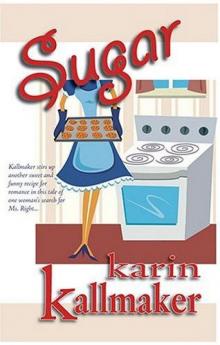 Sugar
Sugar Love by the Numbers
Love by the Numbers Christabel
Christabel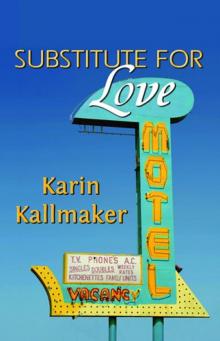 Substitute for Love
Substitute for Love Warming Trend
Warming Trend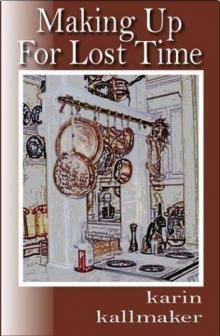 Making Up for Lost Time
Making Up for Lost Time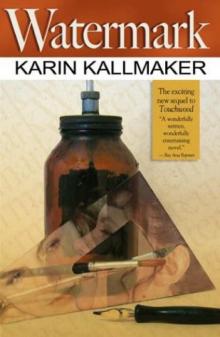 Watermark
Watermark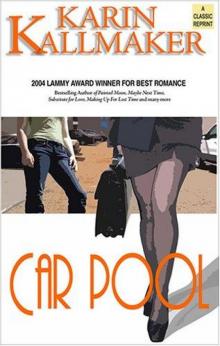 Car Pool
Car Pool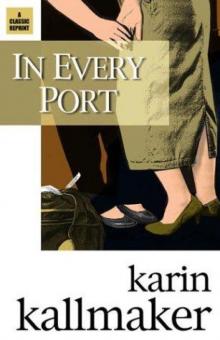 In Every Port
In Every Port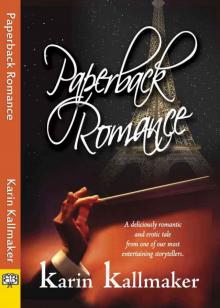 Paperback Romance
Paperback Romance Roller Coaster
Roller Coaster Frosting on the Cake
Frosting on the Cake One Degree of Separation
One Degree of Separation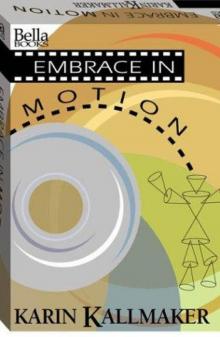 Embrace in Motion
Embrace in Motion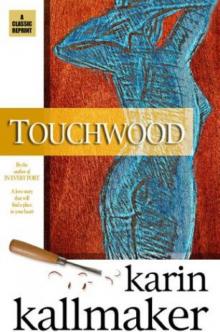 Touchwood
Touchwood Above Temptation
Above Temptation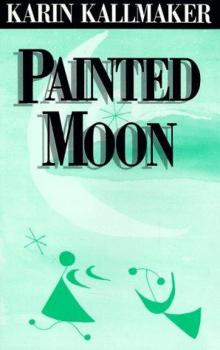 Painted Moon
Painted Moon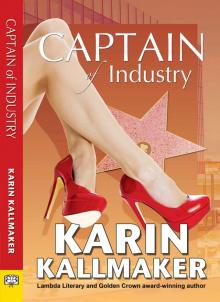 Captain of Industry
Captain of Industry The Kiss That Counted
The Kiss That Counted Wild Things
Wild Things